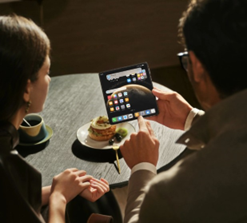AI is being used more and more in smartphones to enhance user experiences, performance, and photography. Beyond technology, it's changing how devices function, think, and interact with people. Behind the scenes, AI enhances battery life, multitasking, and feature use. By controlling background apps and identifying patterns, artificial intelligence is turning cellphones into intelligent companions. Voice assistants, personalized app recommendations, and smart camera features are all examples of how rapidly smartphones are evolving. Every day, AI makes phones smarter and faster for every user.

What Role Does AI Play in Smartphone Performance?
AI-Powered Processors and Energy Efficiency
Modern smartphones utilize AI-integrated chipsets to divide processing power based on user activities. Huawei smartphones use Kirin CPUs with AI to increase energy efficiency and performance. These CPUs recognize demanding tasks such as gaming or editing and provide power without overheating. They use less power for normal tasks to save battery life. This balance enhances both speed and efficiency. Consumers benefit from AI-based CPU decision-making since it allows for easier multitasking, better battery life, and a longer-lasting phone.
Enhancing App Launch Speed and Background Optimization
AI speeds up the app by identifying user habits and preloading frequently used apps. Huawei uses behavior modeling to predict when and how you will use its apps, allowing them to launch practically instantaneously. It prioritizes memory for daily-used background apps and automatically freezes seldom-used ones. This maintains your phone's speed without using up any resources. AI understands user patterns to keep phones responsive and seamless. AI improves not just the amount of RAM but also its consumption.
Intelligent Battery Management Systems
AI extends battery life by analyzing your phone usage and adjusting power settings accordingly. Based on your activity, it can automatically decrease screen brightness, stop background synchronization, or activate power-saving settings. Over time, it learns when and how long you usually charge your phone, optimizing charging speeds to safeguard battery health. If you're experiencing issues like ChatGPT not working huawei, it might be due to aggressive AI battery optimization settings limiting background processes. With AI-driven power management, the phone adapts to you, delivering the right balance between performance and endurance in every scenario.
How AI Enhances Smartphone Photography and Videography?
Scene Detection and Auto-Enhancement Features
Artificial intelligence improves smartphone photography significantly by automatically altering camera settings for food, landscapes, pets, and people. Huawei smartphones' AI camera technologies increase photo quality by optimizing color, contrast, and brightness. Food images are brighter, but sunsets retain warmth. AI handles everything—no adjusting is necessary. It enhances facial features, softens backgrounds, and optimizes lighting. Regardless of the scenario or competence, these easy adjustments make every user feel like a skilled photographer.
AI for Real-Time Video Stabilization and Editing
Video stabilization uses AI to detect and correct motion in real time. Huawei's AI algorithms smooth out jerky movement and maintain clarity as you record. They monitor topics and use auto-focus to concentrate on a task. AI-powered editors suggest highlights, apply filters, and adjust music to match video tone. These features make refining cinematic film without professional equipment easy. When walking, sprinting, or photographing fast-paced action, AI ensures that your recordings remain steady, sharp, and engaging.
Smart Portrait Mode and Low-Light Imaging
Huawei's AI-powered portrait mode uses depth detection and edge mapping to accurately distinguish people from their backgrounds. This mimics professional camera blur. AI uses multi-frame fusion, noise reduction, and exposure balancing to create beautiful, detailed photos in low light conditions without the need for flash. Faces and light sources are effectively highlighted. This allows you to capture stunning portraits or night shots with a single swipe. AI makes shots crisp, well-lit, and atmospheric, transforming tough settings into stunning photos with no manual adjustments.

How Does AI Personalize the User Experience?
Voice Assistants and Natural Language Processing
Huawei phone Artificial intelligence voice assistants use natural language processing to understand and respond to complex queries. They consider context and meaning, as well as keywords. Inquire about tomorrow's weather and then ask, "Should I bring an umbrella?" The assistant receives it. AI learns your accent, tone, and speaking style to make conversations more natural. Voice commands can control smart gadgets, calendars, and communications. With this seamless interaction, smartphones become active digital assistants, simplifying daily tasks.
Adaptive Display and Usage Behavior Learning
AI adjusts screen brightness, color tone, and refresh rate based on your activity and surroundings. To reduce eye strain when reading at night, it warms the screen tones. Outdoor footage is brightened for clarity. Huawei's AI learns your preferences and adjusts settings for you. It raises refresh rates for smoother graphics when gaming and decreases them when browsing to save energy. These tiny changes result in a more enjoyable, personalized viewing experience depending on your device's usage.
AI in Predictive Text, App Suggestions, and Notifications
AI anticipates text based on your writing style and often used terms, which improves typing. It suggests emojis, autocorrects correctly, and completes sentences. AI provides home screen app shortcuts depending on time, location, or use patterns, such as launching your fitness app at the gym. It prioritizes critical warnings to minimize distractions. Important alerts are highlighted, while inconsequential ones are muted. This proactive intelligence streamlines your phone experience by displaying what's important when you need it.
Conclusion
AI is slowly making smartphones smarter, better at what they do, and easier to use. It helps with battery management, taking pictures, voice commands, and suggesting apps depending on how you use your phone. Huawei smartphones employ AI to make sure that your experiences are smooth, reliable, and tailored to you. Your phone fulfills your needs as it learns, changes, and grows. As AI becomes better, smartphones will become smarter and easier to use. The future of mobile is faster technology and better software that works for everyone.





